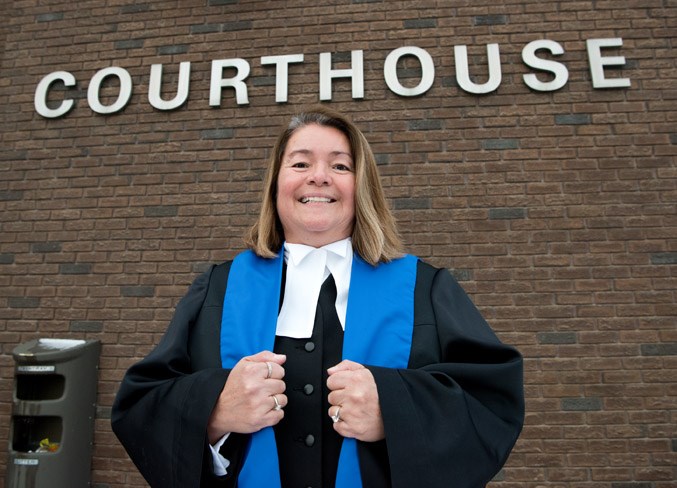She’s a mother, a marathoner and a master of cabbage soup.
And as of last week, she’s a legal pioneer.
The Alberta government appointed three women as provincial court judges last week. One of them is Cheryl Arcand-Kootenay, a St. Albert resident and member of Alexander First Nation.
Arcand-Kootenay is the first Alexander and first female Treaty 6 member ever to become a judge, and one of only a handful of Indigenous judges in Alberta. From her new home base in St. Paul, she’ll be dispatched to hear cases everywhere from Lloydminster to Fort McMurray to Leduc.
Arcand-Kootenay said her inbox has been flooded with congratulations since the news broke Nov. 6, many of which have called her a role model.
But to hear her tell it, she never meant to get into law – she was just looking for a good job. She had no lawyers in her family tree – she’s the first lawyer to come out of Alexander – and knew nothing about the law.
“I don’t think I’d even been in a courthouse, to be honest,” she said.
“It was either architect or lawyer,” she recalled, and she couldn’t draw quickly.
Arcand-Kootenay said she was the only self-declared First Nations student at the University of Alberta’s law school when she joined it in the late 1980s. Many Indigenous youths didn’t finish high school back then, and few who did went on to law school, she explained.
After being admitted to the bar in 1993, Arcand-Kootenay spent her first year working out of Enoch. She had planned to specialize in criminal law, but that changed when someone from the Office of the Child and Youth Advocate asked her to take on a family law case involving five youths. It was the start of what turned out to be a 25-year career spent defending the rights of Alberta youths caught up in the province’s child welfare system.
“You have the most vulnerable people in society,” Arcand-Kootenay said, and you’re often dealing with situations of homelessness, addictions or domestic violence. Many of these kids just want to go home.
Maskwacis-based lawyer Denise Lightning said she’s worked with and faced off against Arcand-Kootenay in court for 15 years, and considers her a consummate professional.
“Even if you didn’t agree with her point of view, you had to respect her position,” she said.
Arcand-Kootenay has been a tireless worker who crisscrossed the province to help clients and went out of her way to support her peers, Lightning said. She’s also got the respect, strength and legal knowledge you need to be a good judge.
Brooks Arcand-Paul, Arcand-Kootenay’s nephew, credits her with inspiring him to become a lawyer himself.
“I saw from a very young age just how dedicated she was,” he said – there were always legal papers everywhere at her home – and she was helping give kids a voice in the courtroom. That’s why he decided to aim for law school back in Grade 3.
“She made it seem that it was attainable because she did it.”
Outside of court, Arcand-Paul said Arcand-Kootenay is a loving mother, aunt and grandmother, and an avid baseball player and marathoner.
“She makes the best cabbage soup in the entire world!” he added.
Diversity matters
Arcand-Kootenay said her research shows that she is the eighth Indigenous person ever to become an Alberta provincial court judge.Indigenous people are over-represented in Canada’s criminal justice and child welfare systems, with some 70 per cent of kids in provincial care being Métis, First Nations or Inuit, Lightning said. While the Supreme Court now requires judges to account for the circumstances facing Indigenous people (e.g. residential schools, poverty) during sentencing, many people have never visited a reserve and have never experienced those circumstances.
“Real understanding, in my view, comes from lived experience,” Lightning said, and Arcand-Kootenay brings that to the bench.
Arcand-Kootenay said she hoped her knowledge of Indigenous communities and support programs would help her make a difference in the Alberta legal system. She urged all Indigenous law students to be proud of their cultural identity and to stick with it.
“Dream big, because you can reach it.”




